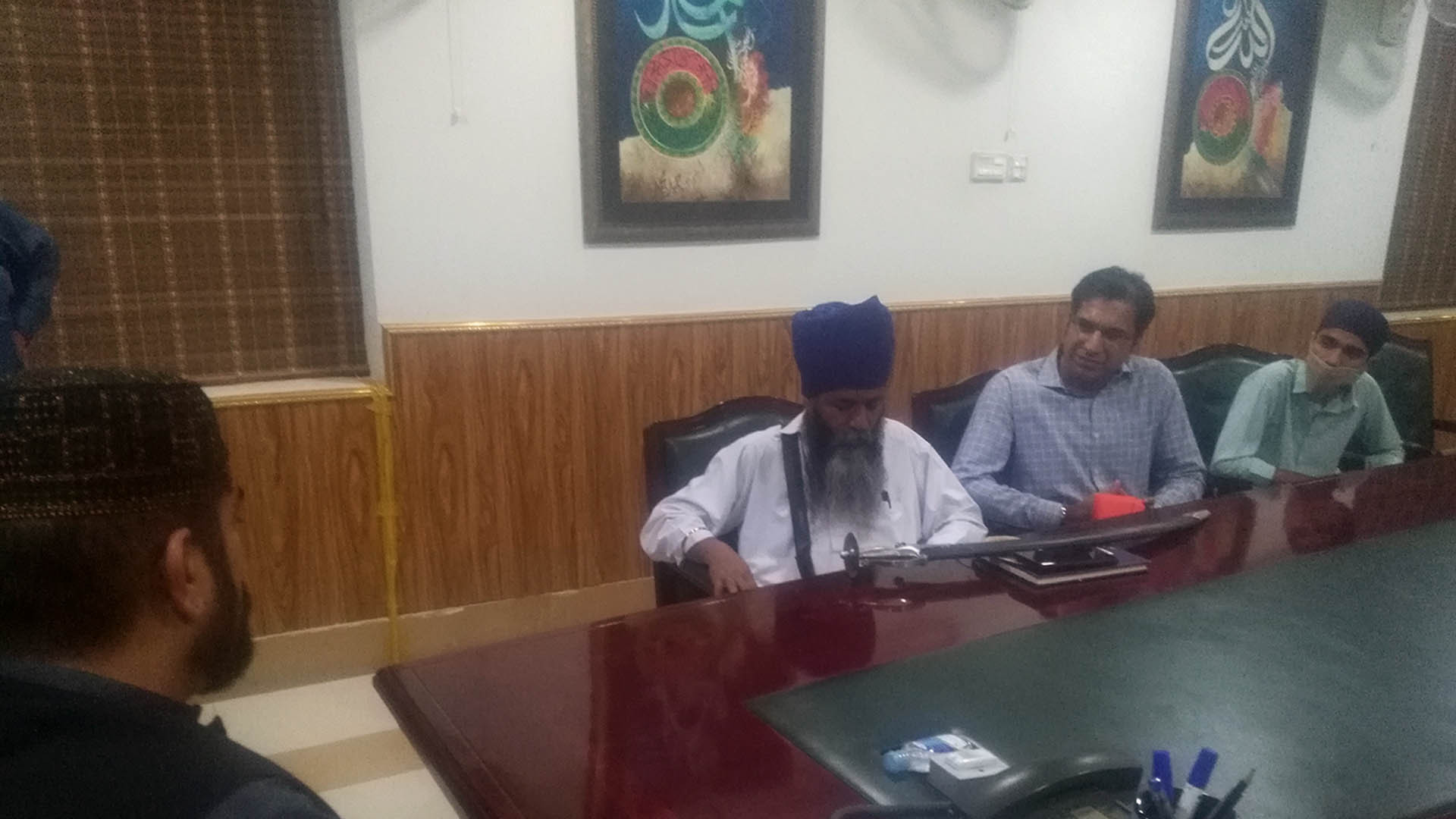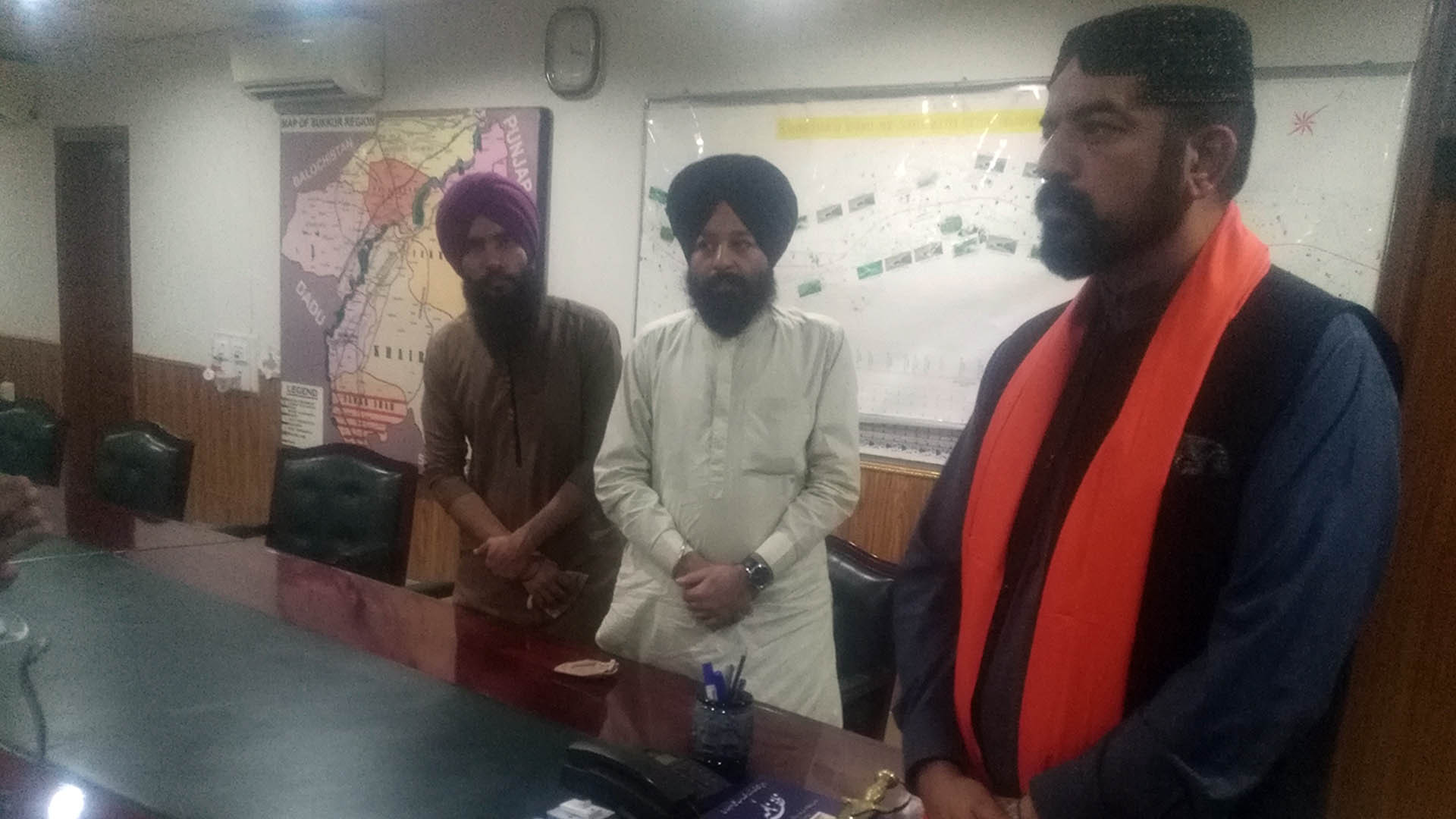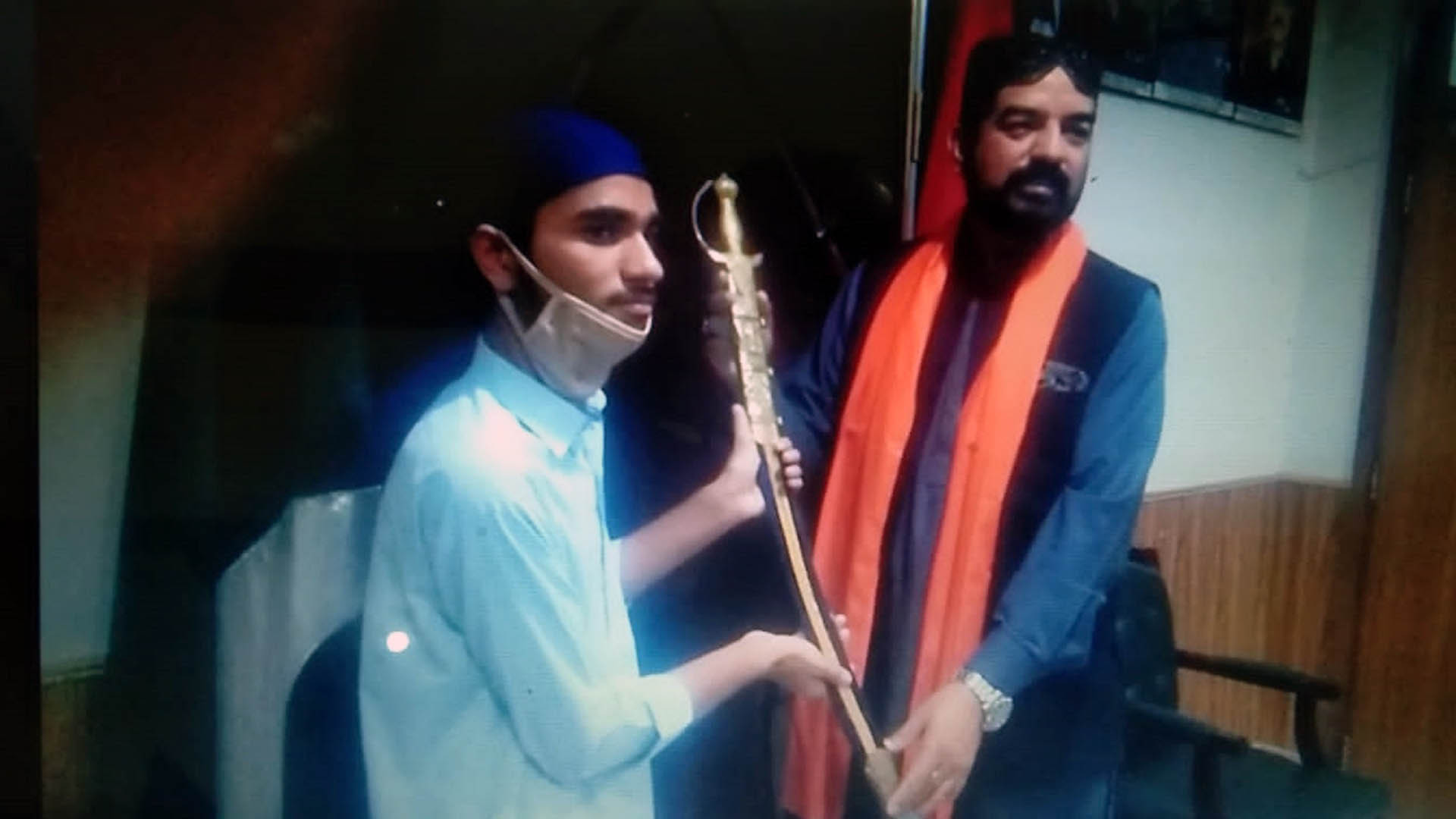“Have you ever seen a Sufi in uniform? Asks Sardar Deva Sikandar Singh during a meeting at the office of the DIG Police Sukkur. “If not, look at this man standing tall in front of me,” he says while pointing to a modestly smiling Jawed Sonharo Jiskani, DIG Police Sukkur. “If I could, I would like to call him a “fakir” or “Allah wallah” [man of God].
Sardar Deva Sikandar Singh was visiting the DIG’s office along with other sikhs to present him a kirpan, a short sword or knife with a curved blade, worn [sometimes in miniature form] as one of the five distinguishing signs of the Sikh Khalsa. It was presented as a token of appreciation for the DIG being outstandingly principled and kind, considerate, and caring to people, especially the helpless and marginalised. “I have come across and met many police officers in my life, but honestly speaking, I haven’t seen one with a golden heart like Jiskani,” says Singh, sounding a tad emotional.
Earlier, Singh was reading an interview of the DIG, where something the latter said had deeply inspired the Sardar. The DIG was visiting an injured policeman in a hospital in Rahim Yar Khan and replying to a question by reporters, the DIG had said that a Muslim cannot be a rapist, in other words, the rapist cannot be a Muslim [implying that a criminal has no religion because all religions teach the same values of goodness and purity]. “These words brought tears into my eyes and I couldn’t believe that even today there are police officers who are so righteous and good hearted,” says Singh. “The next moment, I decided to honour him with a kirpan that was earlier presented to me by Sardar Rawal Singh, the then Head Granthi of Nankana Sahib.”

Singh elaborated that there are five fundamental Ks for Sikhs such as the kesh [unshorn hair and beard], kangha [a comb for the kesh, usually wooden], karra [a bracelet, usually made of iron or steel], kachera [an undergarment], and kirpan [a small curved sword of any size, shape or metal] which every Sikh is religiously bound to carry.
“I am tremendously inspired by the teachings of Islam and all other religions too preach righteousness,” he says. “Our Guru Nanak also taught us to be kind to the fellow human beings and refrain from sin which includes rape or involving in extra-marital affairs etc.”
Gracefully accepting the Sikhs’ gift, the DIG who is also a writer and poet explained that in that interview, he had spoken particularly about child molesters and child murderers being inhuman. “It is my belief that a Muslim cannot even think of perpetrating rape or any such activities [implying that anyone who commits these heinous crimes has no religion] and such culprits must be dealt with an iron hand,” he says. “A police officer must be a tyrant for the oppresser and soft-hearted for the oppressed, as this is the only way to provide justice to the helpless and oppressed.”
Jiskani belongs to a poor and uneducated family from the village Naubat Khan Marri of Tando Allah Yar, near Hyderabad. “Neither my father and nor my uncles or other relatives ever went to school,” he says. “But since early childhood I wanted to go to school and become educated. In school, I got good grades and passed my exams with flying colours.”
Jiskani’s diverse career background and impressive portfolio boasts of a wealth of experience, skills, and achievements that demonstrate his dedication to public service. Interestingly, he began working as an English language teacher at Bright Kids Academy, Hyderabad, from 1994 to 1995 and later he joined a bank as a grade II officer in Islamabad and Hyderabad where he worked for the next five years. “Somehow, I got bored in the banking sector, joined Sindh police as ASP and got posted at Khairpur, Gujranwala and then Multan Cantonment and Rahim Yar Khan as SDPO.”

After a couple of years, Jiskani was promoted as the SP Investigation in Khairpur, where he worked till 2006, until his next his promotion as SSP/DPO for a year. He also served as the sector commander Karachi-Hyderabad Pakistan Motorway Police for eight months in 2007 and then was posted as the SSP Ghotki until 2009. After that for a year, Jiskani worked as AIG Forensic Division, Sindh Police Karachi and following that, for the next six years, he served as SSP in Dadu, Naushahro Feroze, Larkana, Jacobabad, Nawabshah, Shikarpur and Karachi.
“After my promotion in 2018 as DIG, I was the Director Training FIA, Director IP at Export Processing Zones Authority, Ministry of Industries and Production, DIG Rakhshan Division at Kharan Balochistan and DIG Makran Division at Gwadar Balochistan before becoming DIG Sukkur,” says the DIG, who is in his fifties.
“I have done many professional courses and trainings in different cities of Pakistan and abroad,” says the DIG, who was determined and dreamed big even as a child. Being the first man from Naubat Khan Marri to contest CSS Examination in 1999, he secured 21st position all over Pakistan, and chose to serve in the police force.
In 1997, he wrote his first book titled Understanding English Grammar followed by several others such as Introduction to Sociology, On the Art of Writing Essays in English, The Power of Social Media and Policing Challenges, The Daughter Of Land Of Pure, Sociology in the 21st Century, A Perspective of Pakistani Society, Policing Insights, a novel Whiter Than White, and his latest book from last year called Reimagining Policing in Pakistan.
Jiskani’s academic qualifications are as awe-inspiring as his professional portfolio. He has done his Masters in Sociology from the Sindh University Jamshoro, followed by one in International Relations, an MSc Criminal Justice Policy from the London School of Economics, and LLM International Security from the University of Manchester, UK.
 Jiskani believes that policemen are first human beings and then policemen. “So if we appear to be heartless, it is because our line of work requires us to be tough and strict with rules and law, but it does not mean that we don’t understand human emotions,” he says. “Apart from being a police officer, I am a soft-hearted person, but not for criminals. We are bound by duty to curb crime and provide a peaceful society for law-abiding citizens.”
Jiskani believes that policemen are first human beings and then policemen. “So if we appear to be heartless, it is because our line of work requires us to be tough and strict with rules and law, but it does not mean that we don’t understand human emotions,” he says. “Apart from being a police officer, I am a soft-hearted person, but not for criminals. We are bound by duty to curb crime and provide a peaceful society for law-abiding citizens.”
There must have been numerous, diverse and horrific criminal incidents in Jiskani’s police career, but one incident has deeply disturbed him.
“I was posted in Nawabshah, and a truly horrible case of a six-year-old girl being raped and killed came to me, which literally squeezed my heart,” says the DIG. “It was a blind case, but with some untiring and relentless effort, we managed to arrest the culprit within 40 hours. Believe me, even though it has been almost a decade now, but whenever I remember that incident, it still sends shivers through my spine.”
Despite all the horrors that police officers deal with in a day’s work, it is not always the bad stuff that leaves an impact on them. During Jiskani’s posting as under-training SDPO in Gujranwala, an old man on a bicycle once came to his office and gave him some life-altering advice that has stayed with him ever since.
“I was busy in my office, when this gentleman appeared and introduced himself as a retired DSP,” recalls Jiskani. “He said he wanted to give me some tips. I sat him down and he started talking to me. The retired officer said that he had learnt one lesson during his 40-year-service. He believed that all police officials are overly concerned about their Annual Confidential Report (ACR), which is written by their immediate officer, but we should always remember that apart from that departmental ACR, three more ACRs are recorded against us or in our favour. One is by our subordinates, second by the people of the area where we are posted, and the third is recorded by God. Then he asked me why are we so anxious about the departmental ACR and least concerned about three other ACRs? We should only worry about the ACR that is recorded by God and forget about the others. It was deep, but what he said were golden words for me, and since that day I remember his advice every single day.”
After a day that could entail meetings and desk work to confronting a variety of criminal situations, at home, the DIG relaxes by reading or writing books and listening to classical music and his golden era favourites from the subcontinent.
After the disastrous floods of 2022, Jiskani got his friends together to establish relief camps in Sukkur, Khairpur and Ghotki, where flood-hit people were provided shelter, food and medical facilities.
“We also ran free eye camps, where many people were provided treatment and medicines for eye ailments,” he says. “I feel it is our duty to do whatever we can within our limits for the less privileged, and I am fortunate to have friends who readily and generously provide funding for this purpose.”
Considering that Jiskani is so accomplished, experienced and diligent, one wonders what is next on his work agenda ― retirement plans, another book or a new role to serve people? “After retirement, I plan to establish a charity organisation to help the poor and needy,” he says. “Not only that, I also have plans to do something in the field of education for the under-privileged so that they can make their lives worthwhile.”
Sarfaraz Memon is a freelance journalist and contributor based in Sukkur. All facts and information are the responsibility of the writer
